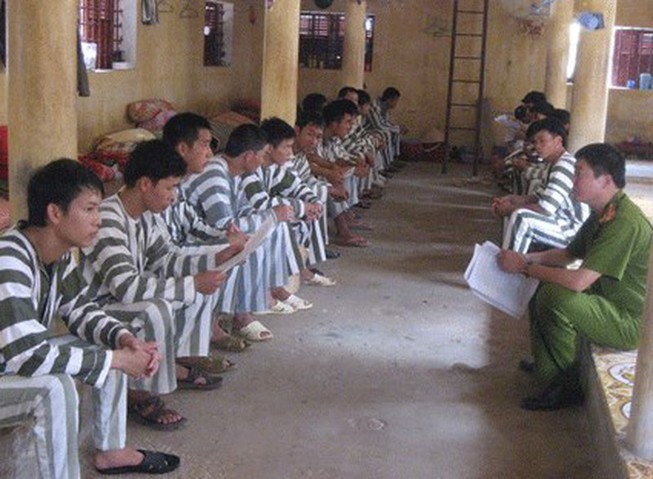Prohibition for prisoners knowing but not using Vietnamese in communication in detention centers in Vietnam
Recently, the Ministry of National Defense of Vietnam issued Circular 132/2012/TT-BQP promulgating regulations on military detention centers.

Prohibition for prisoners knowing but not using Vietnamese in communication in detention centers in Vietnam (Illustrative image)
According to Articles 5, 6, and 7 of the military prison regulations issued with Circular 132/2012/TT-BQP, a number of living requirements in prisons that prisoners must comply with are specifically outlined as follows:
Firstly, when entering or exiting the prison gate or detention area, prisoners must comply with the inspection and control of prison officers, remove hats and hold them in their right hand, and clearly report their full name, group, and team to the responsible officer. If moving in a group of fewer than 10 people, they must walk in a single line, holding hats in their right hand; if 10 or more people, they must form two lines, with the left line holding hats in the left hand and the right line holding hats in the right hand. The group leader (or team leader) and the prisoner must report to the responsible officer.
Secondly, in communication between prisoners, prisoners who know Vietnamese may only use Vietnamese and address each other as “tôi”, “anh” or “chị”. When meeting officers, visitors, or working at the prison, prisoners must stand at attention at a distance of 5 to 7 meters, remove hats, and hold them in their right hand, and say “chào cán bộ” or “chào quý khách”. If a group or team of prisoners meets officers, visitors, or people working at the prison, the group leader or team leader must call everyone to stand at attention, remove hats, and on behalf of all prisoners say “chào cán bộ” or “chào quý khách”. Prisoners must address officers as “cán bộ” and themselves as “tôi”. Prisoners knowing Vietnamese are prohibited from not using Vietnamese, communicating in slang in any form; any actions or words lacking cultural respect or insulting others are prohibited.
Thirdly, within the detention cells and areas:
- Prisoners must lie in the assigned place in the detention cell, maintain cleanliness of their living area and public places; not move freely beyond the designated areas; and must undergo daily roll call inspections by prison officers.
- Prisoners must comply with schedules, commands, and other regulations regarding living, studying, laboring, sleeping, resting, and recreational activities. Male prisoners must have short haircuts according to regulations, not shave their heads, and not keep beards, fingernails, or mustaches.
- When there is a general call, prisoners must quickly line up by group and team and maintain order; in case of an alarm, they must stay in place and strictly follow the instructions of the prison officers.
- Prisoners are prohibited from changing their assigned places, causing disorder in the prison, writing, or drawing on walls, doors, and public areas; prisoners are prohibited from cooking, eating in detention cells; smoking tobacco or hookah is prohibited in detention cells, infirmary, punishment cells, library, reading rooms, study rooms, collective living areas, labor workshops, or any places where fires or explosions might occur.
Detailed information can be found in Circular 132/2012/TT-BQP, effective from January 21, 2013.
Le Vy
- Key word:
- prisoner
- detention center
- Vietnam
- Number of deputy directors of departments in Vietnam in accordance with Decree 45/2025/ND-CP
- Cases ineligible for pardon in Vietnam in 2025
- Decree 50/2025 amending Decree 151/2017 on the management of public assets in Vietnam
- Circular 07/2025 amending Circular 02/2022 on the Law on Environmental Protection in Vietnam
- Adjustment to the organizational structure of the Ministry of Health of Vietnam: Certain agencies are no longer listed in the organizational structure
- Vietnam aims to welcome 22-23 million international tourists in Vietnam in 2025
-

- Number of deputy directors of departments in Vietnam ...
- 15:04, 05/03/2025
-

- Cases ineligible for pardon in Vietnam in 2025
- 14:43, 05/03/2025
-

- Decree 50/2025 amending Decree 151/2017 on the ...
- 12:00, 05/03/2025
-

- Circular 07/2025 amending Circular 02/2022 on ...
- 11:30, 05/03/2025
-

- Adjustment to the organizational structure of ...
- 10:34, 05/03/2025
-

- Notable new policies of Vietnam effective as of ...
- 16:26, 11/04/2025
-
.Medium.png)
- Notable documents of Vietnam in the previous week ...
- 16:21, 11/04/2025
-
.Medium.png)
- Notable documents of Vietnam in the previous week ...
- 16:11, 02/04/2025
-
.Medium.png)
- Notable new policies of Vietnam to be effective ...
- 16:04, 02/04/2025
-
.Medium.png)
- Notable new policies of Vietnam effective from ...
- 14:51, 21/03/2025
 Article table of contents
Article table of contents
